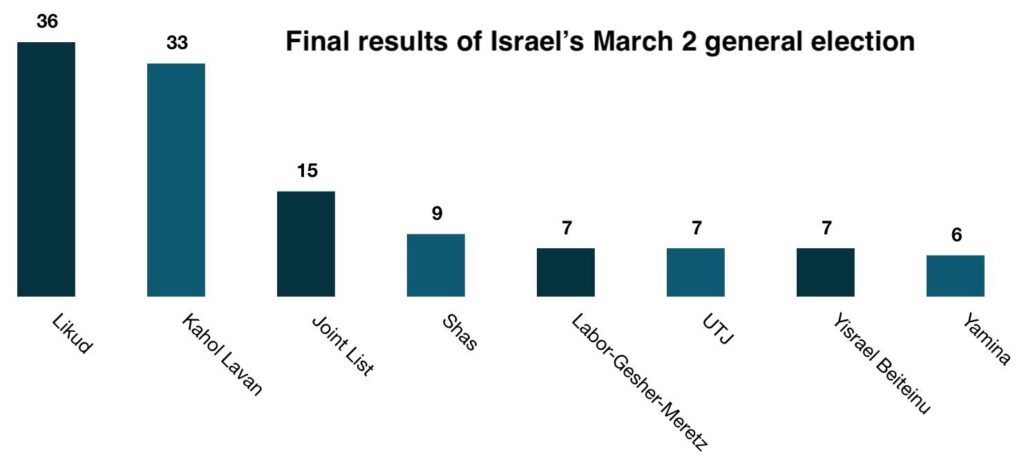FRESH AIR
Climbing off fence, Lieberman apparently moving to oust Netanyahu
March 6, 2020 | Ahron Shapiro

In a normal Israeli election, a result showing Likud as the largest party and head of the largest bloc, even if not quite holding a majority of the Knesset seats, would naturally give that party a huge advantage in forming a government.
But last Monday’s election was anything but a normal election, having been the third in under a year along with Israeli Prime Minister Binyamin Netanyahu post-election vying to form a government even after being indicted on charges of bribery, fraud and breach of trust.
After the final votes were counted, the most important number that is driving post-election politics is not the 36 seats that Netanyahu’s Likud received (three ahead of its rival Kachol Lavan, or Blue and White, led by Benny Gantz), nor the 58 members of the centre-right bloc (three ahead of the centre-left bloc of Kachol Lavan, Labor-Gesher-Meretz and, tacitly, the primarily Arab and hard-left Joint List). The number that matters is the 62 seats held by the centre-left list with the addition of the seven seats held by Avigdor Lieberman’s Yisrael Beitenu party.

On March 5, Lieberman, who did not recommend either Gantz or Netanyahu as prime minister after the previous election on September 17, was reportedly planning to recommend Gantz as Prime Minister this time. If the Joint List decides to do the same, President Reuven Rivlin would be compelled to give Gantz the chance to form a government before Netanyahu.
Lieberman has for years positioned his party to the right of Likud and pushed politics anathema to Israeli Arabs such as compelling them to take a loyalty oath to the state and has advocated the transfer of land containing Israeli Arabs living along Israel’s eastern border to Palestinian rule. Can he now be considered part of the centre-left bloc?
Who can forget that, on November 20 of last year, after coalition talks with Gantz following the September election, Lieberman refused to cooperate with a government that relies upon the Joint List, calling the party a “fifth column”.
“We won’t enter a government backed directly or indirectly by the Joint List,” Lieberman said at that time.
What, then, is going on?
On March 5, Israel Beitenu held a party meeting to discuss the election results and announced it would “move forward with the promotion of two laws: The first law [will] limit the tenure of a prime minister to two terms. The second law [will] prevent an MK facing indictment from forming a government.”
Both laws are clearly targeted at Netanyahu, to prevent him from trying his luck in a fourth election. Passage of such laws would require majority votes in the Knesset.
As a report in Haaretz explained on March 6, “recommending Gantz as prime minister is critical because whoever is asked to try to form a government first will control the special arrangements committee, which organises the Knesset’s work between an election and the formation of a government. Without control of that committee, it would be impossible to advance the bill[s] through the necessary four votes.”
Yet Lieberman is reportedly willing to go further than merely recommending Gantz and may have possibly changed his mind about being part of a government supported by the Joint List.
Citing an unnamed source close to Lieberman, Israel’s Channel 12 reported on March 6 Lieberman saying, “We won’t let Netanyahu go to a fourth election. Our goal is to establish a government as quickly as possible and to send Netanyahu to his retirement.”
To reconcile the contradiction between Yisrael Beitenu’s politics and its participation in a centre-left government requires a scenario that Barak Ravid, correspondent for Israel’s Channel 13, terms a “removal government”. In an op-ed on March 5, Ravid envisioned a temporary government that would be formed with very specific goals in mind, first and foremost the toppling of Netanyahu, and end with a national unity government once Netanyahu is off the political stage.
Likud advances its own strategy
Meanwhile, as Lieberman and Gantz talk about an anti-Netanyahu bloc, the Likud is moving ahead with its own strategy – to reach a 61-seat majority and forming a narrow centre-right government by luring away three MKs from centre-left parties with promises of lucrative portfolios.
Among those seen as possible defectors are: MK Orly Levy-Abekasis, head of the Gesher faction in the Labor-Gesher-Meretz alliance, who is the daughter of former Likud Foreign Minister David Levy; and Blue and White MKs Zvi Hauser and Yoaz Hendel, both former aides to Netanyahu.
Still, as of now, there are no MKs outside of Netanyahu’s centre-right bloc who have given any indication they would consider helping the Likud form a government.
What’s next?
By March 9, President Rivlin is expected to consult with the faction leaders, in order to assign the task of forming a government to one of the candidates. Whoever gets the most recommendations is likely to be given the first opportunity to form a government
The inauguration of the 23rd Knesset will take place on March 16.
RELATED ARTICLES

US Middle East strategy amid regional instability: Dana Stroul at the Sydney Institute

Antisemitism in Australia after the Bondi Massacre: Arsen Ostrovsky at the Sydney Institute





















